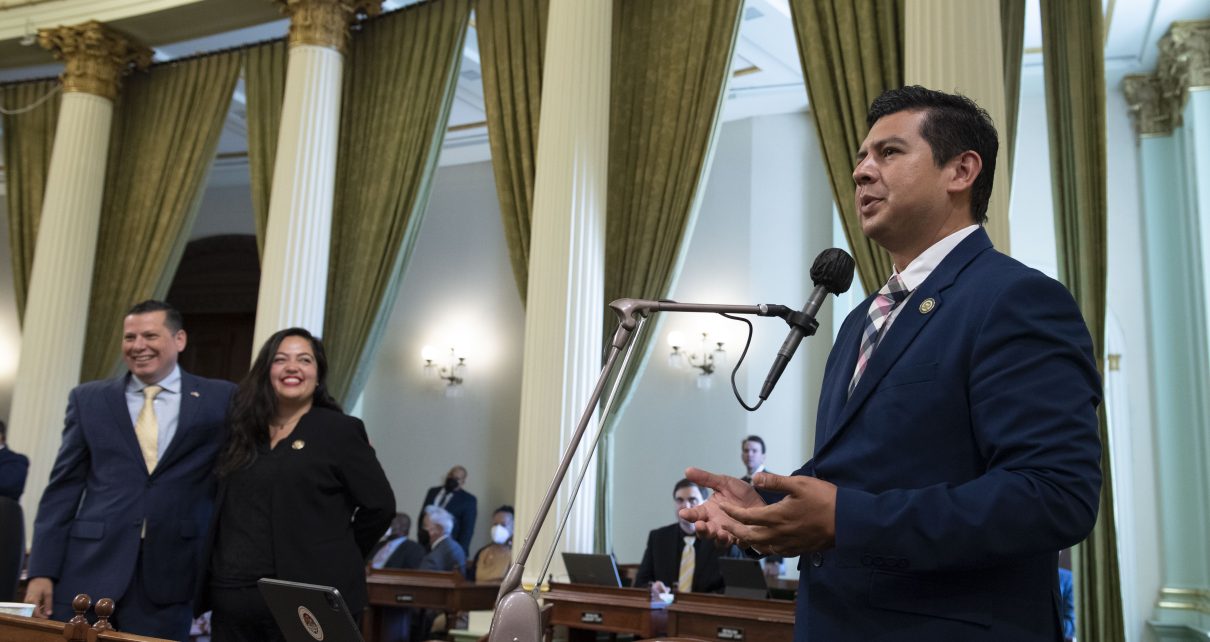
Assemblyman David Alvarez (Photo: https://a80.asmdc.org/photo)
CA Bill To Allow Binational Students In Mexico Receive In-State Tuition Progresses
AB 91 would create 5-year pilot program covering 200 students a semester
By Evan Symon, February 6, 2023 7:46 pm
A bill that would set up a pilot program to allow students who live in Mexico to attend Community College in San Diego County and Imperial County at in-state costs awaited to be heard in the Assembly Higher Education Committee on Monday, over a month after being introduced.
Assembly Bill 91, authored by Assemblyman David Alvarez (D-San Diego), would specifically exempt non-resident, low-income students from Mexico from the non-resident tuition fee at any San Diego and Imperial Counties Community Colleges Association (SDICCCA) college. The program would have a strict capacity limit of only 200 students who could partake in the program, with a further caveat limiting the program to only those who live within 45 miles of the U.S.-Mexico border. Students would also have to be either American or Mexican, with a valid visa allowing them to go across the border.
AB 91 would also set up this as only a pilot program, with the bill to be inoperative on July 1, 2028, and then fully repealed on January 1, 2029.
Assemblyman Alvarez wrote the bill due to the numerous difficulties many binational students have while trying to attend community college in either San Diego County or Imperial County. Many students often commute from Mexico to attend U.S. colleges, either spending hours a day in line at the border or coming up with odd living arrangements where they spend time partially in the U.S. with family or friends to get to class somedays without the hassle at the border, then live in Mexico due to the cheaper cost of living.
As the vast majority of these students low-income, binational students who were born in the U.S., a big roadblock to them being able to afford living in the U.S. has been expenses. AB 91 would slash these expenses with in state-tuition, bringing down costs to $46 per unit, as compared to the non-resident cost of $300 per unit.
Binational students living near the border, many of whom are U.S.-born children in low-income households, attend school in California but may live in Mexico because it’s more affordable. Alvarez also argues that this would help ensure a future workforce in California by bringing them back into the state.
“It’s a well-integrated economy that we’re proud of in this region,” said Alvarez recently. “We hope that by educating the future workforce — which happens to live on the Mexican side — we can continue to grow as a region and create more economic opportunities. We believe so strongly in our region and believe it’s important to treat binational students as residents with in-state tuition as opposed to foreign students. This is a testament to the quality of education that our community colleges are providing. They can serve students from other places, especially when it makes sense geographically as it does for our unique region down here in San Diego. People think that you have to go far from San Diego to get to Mexico. No, we are there.”
Questions over cost, keeping graduates in California linger over AB 91 debate
Community colleges, which have been struggling with lower enrollment in recent years including hitting a 30 year low last year following a nearly 20% across the system drop, have praised the bill as a way to help encourage students to come back and enroll.
“A lot of community colleges are struggling with lowered enrollment right now,” explained Amy Smith, a community college administrator with some recruitment duties, to the Globe on Monday. “The COVID pandemic hurt us a lot, and we are still far below where we were in 2018, 2019. I’m not sure how helpful this bill would be overall, especially because it cuts into what we could be getting from non-residents, but it would also be at least something and would boost up attendance once more. A lot of these types of students are also struggling, so saving several thousand a semester could help them out.”
However, since being introduced last month, many have spoken out against the bill, arguing that there has been no estimated cost of the bill and that the program would only add to the state’s projected $22.5 billion deficit. Others have said that the state needs to ensure that those under the program would need to stay in the state following the program and be part of the workforce here instead of other places.
In a statement, Assemblyman Devon Mathis (R-Visalia) noted that “We need to ensure this bill won’t pull funds away from the rest of the community college system, and do more to encourage students to stay in California and build their careers here after graduation. With a $22 billion deficit, we should look to public-private partnerships with businesses and the trades rather than creating a new taxpayer-funded program.”
“Dana” a capitol staffer, also told the Globe on Monday that, “There is a lot of concern about the total cost, even from Democrats. We’re having budget problems again, and if it turns out to be an expensive pilot program, they don’t want that hanging over the state for the rest of the 2020s. ”
- Port Of Oakland Appeals Temporary Court Ruling Blocking use of ‘San Francisco Bay’ In Name - December 13, 2024
- Farmers Insurance to Increase Number Of Homeowner & Renter Policies in California - December 12, 2024
- Gov. Newsom Announces April 29, 2025 Special Election Date for Two State Elections - December 12, 2024





I urge you to vote NO on such an endeavor until ALL of our own citizen students have received their education.
Readers find your legislators and their contact info below. Call or write them to let them know where you stand each time one of these unacceptable is thrown at us:
senate.ca.gov/senators
assembly.ca.gov/assemblymembers
California has a projected budget deficit of billions of dollars (actually it’s a budget deficit of trillions of dollars if unfunded government pension liabilities are included) but fiscally irresponsible Democrats like San Diego Assemblyman David Alvarez want to provide in-state college tuition fees to non-resident students who live in Mexico? NO! NO! NO! If students from other U.S. states must pay non-resident tuition fees, then so do non-resident students who live in Mexico!
Democrats are breaking down the need for citizenship – they want global citizen who has no rights
@Orwellianism Yup, but who will of course still vote for Democrats.
@Orwellianism Yup, but who will of course still vote for Democrats.